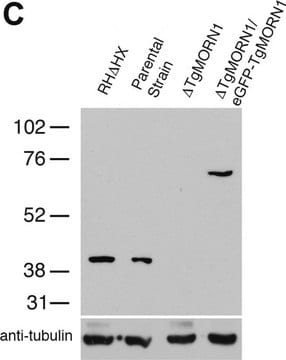ABT171
Anti-alpha Tubulin Antibody, tyrosinated
serum, from rabbit
Synonym(s):
Tubulin alpha-1A chain, Alpha-tubulin 3, Tubulin B-alpha-1, Tubulin alpha-3 chain
About This Item
ICC
WB
immunocytochemistry: suitable
western blot: suitable
Recommended Products
biological source
rabbit
Quality Level
antibody form
serum
antibody product type
primary antibodies
clone
polyclonal
species reactivity
monkey, mouse
species reactivity (predicted by homology)
rat (based on 100% sequence homology), human (based on 100% sequence homology)
technique(s)
ELISA: suitable
immunocytochemistry: suitable
western blot: suitable
NCBI accession no.
UniProt accession no.
shipped in
wet ice
target post-translational modification
unmodified
Gene Information
human ... TUBA1A(7846)
General description
Specificity
Immunogen
Application
ELISA Analysis: A representative lot from an independent laboratory specifically detected tyrosinated alpha Tubulin, in an indirect ELISA and in a competitive ELISA (Gundersen, G. G., et al. (1984). Cell. 38(3):779-89.).
Immunocytochemistry Analysis: A representative lot from an independent laboratory specifically detected tyrosinated alpha Tubulin and not nontyrosinated alpha Tubulin in TC-7 cells in interphase (Gundersen, G. G., et al. (1984). Cell. 38(3):779-89.).
Quality
Western Blotting Analysis: A 1:2,000 dilution of this antibody detected alpha Tubulin, tyrosinated in 10 µg of untreated NIH/3T3 cell lysate and demonstrated a loss of signal in PCA treated NIH/3T3 cell lysate.
Target description
Not finding the right product?
Try our Product Selector Tool.
Storage Class Code
10 - Combustible liquids
WGK
WGK 1
Certificates of Analysis (COA)
Search for Certificates of Analysis (COA) by entering the products Lot/Batch Number. Lot and Batch Numbers can be found on a product’s label following the words ‘Lot’ or ‘Batch’.
Already Own This Product?
Find documentation for the products that you have recently purchased in the Document Library.
Customers Also Viewed
Our team of scientists has experience in all areas of research including Life Science, Material Science, Chemical Synthesis, Chromatography, Analytical and many others.
Contact Technical Service








